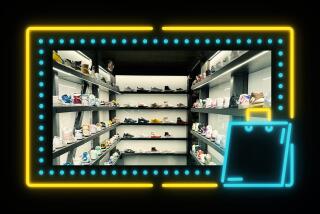Optic Verve : A MOMENT WITH THE LEIGHTS
- Share via
If you think Oliver Peoples sounds more like a Saturday morning cartoon than an upscale eyewear boutique, you wouldn’t be the first.
“They say, ‘People what?’ Or they call it Oliver’s People,” says Dennis Leight who, along with his brother, Larry, and friend Kenny Schwartz, runs the multimillion-dollar eyewear empire and the trendy Sunset Plaza shop. “People don’t know what it means. . . . They misspell it or mispronounce it all the time.”
Even the three partners--all opticians who met while students at Los Angeles Community College in 1970--say they would need psychic vision to uncover the story behind the real Oliver Peoples, a New Yorker who died in the 1930s.
“He was some sort of eyewear distributor,” says Larry, the company’s boisterous chief executive. “When he died, his family put his whole business into a warehouse for storage.”
Oliver Peoples might have continued to rest in obscurity had the brothers not stumbled onto his cache of vintage eyewear nearly 50 years later.
Having worked for various optical shops around Los Angeles--Dennis at competitor L.A. Eyeworks, Larry at highbrow eyeglass chain Optica and Schwartz at his own Eye on LA store in Eagle Rock--the Leights and Schwartz decided in 1986 to go into business for themselves, and opened on Sunset Plaza.
It was Larry who charted the neophyte company’s original direction. He thought American consumers might have tired of the big, colorful imports--gimmicky frames heavy on animal patterns, silver and gold--and would re-embrace some of the classic styles made by U.S. companies such as American Optical, Bausch & Lomb and Chiron from the 1920s to the 1950s.
“Those companies were putting out some really incredible and timeless eye wear--Art Deco frames with beautiful filigree etched into the metals,” recalls Larry, who is given much of the credit for expanding Oliver Peoples from a single retail store to a worldwide operation with $25 million-plus in sales in nearly 50 countries.
While the Leights and Schwartz were putting their plans on paper and spreading the word about their search for vintage frames, a friend told them about a warehouse in New York filled with antique eyewear. “I didn’t really know what he was talking about so I said, ‘sure, go ahead and send me a couple,’ ” says Larry. The partners wound up buying the lot--nearly 6,000 pairs--with which they stocked their store.
Sifting through those boxes, Dennis recalls, they came upon a receipt bearing the name of the original owner of this cache: Oliver Peoples. Their new enterprise had a name.
Many of those vintage frames--which sell from $175 to $300, depending on detailing and rarity--are now housed in drawers in the rear of the 900-square-foot Sunset Plaza shop, which includes a lower-level lab where lenses are ground and prescriptions filled.
From them the owners-designers drew inspiration for their signature line of upscale eyewear, which is made in Japan and sells from $185 to $260 in selected stores around the country. Updates include lenses in the currently popular amber, amethyst, butterscotch and salmon; modern classic tortoise shell looks and sporty looks in antique gold and pewter.
The popularity of Oliver Peoples glasses with celebrities such as Elton John, John Singleton, Meg Ryan, Sandra Bullock and Brad Pitt have helped fuel interest in the line.
“It’s a status thing,” says Larry. “When someone sees a musician or a model or an actor wearing a particular frame, they want it themselves. . . . It makes them feel more in the know, more happening. It’s through celebrities that most people find out what’s hot and what’s not.”
The Oliver Peoples line includes the lower-priced ($165 to $225) collection of women’s sunglasses under the Eyevan label. Mostly made of colored plastics, they are sold through department stores such as Bergdorf Goodman and Neiman Marcus.
A third collection--featuring chunky tortoise shells and classic black plastic frames--carries the Paul Smith label and is produced in conjunction with the British fashion designer. Dennis Leight, who’s responsible for Oliver Peoples’ merchandising and retailing, says the collection, sold in eyeglass specialty stores from $185 to $260, has been a runaway success with those seeking “a quirky, British mod sort of Brian Epstein-ish look.”
The three designers don’t believe that face shape necessarily dictates frame shape. “That’s a question that’s been asked of me for 20 years,” says Dennis. His approach: “I don’t want to restrict somebody from looking at something that might look good on them.”
But, he adds, “You can’t just pick a pair of glasses because they looked good on someone else. You need to understand some things about hair color and skin tone and face and eye shape. And you also need to know that a sporty sunglass that looks good on the beach isn’t necessarily right to wear in town. Each frame has its own character.”
More to Read
Inside the business of entertainment
The Wide Shot brings you news, analysis and insights on everything from streaming wars to production — and what it all means for the future.
You may occasionally receive promotional content from the Los Angeles Times.










